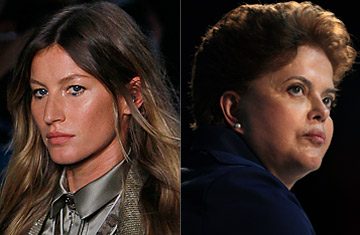
Supermodel Gisele Bündchen, left, and Brazilian President Dilma Rousseff
It's hardly surprising that Dilma Rousseff, Brazil's first female President, has placed women in some of her government's highest positions. But replacing leathery male dinosaurs may have been the easy part. Rousseff's latest opponent is one whom many would have expected to be on her side: Brazilian supermodel Gisele Bündchen.
The political and fashion heavyweights are at odds over recent television ads in which Bündchen instructs women on how to put their feminine charms to practical use: If you crash the car, max out the credit card or invite your mother to stay, the best way to break it to o marido — the husband — is to glide into the room in high heels and sexy lingerie. You pout. You throw your hips to one side. Then you break the bad news.
The campaign for the Hope lingerie label has angered Rousseff's Cabinet-level Women's Secretariat, which in a statement said the ads "reinforce the wrong stereotypes of the woman as a husband's mere sex object and ignore the great advances we've achieved in deconstructing sexist thoughts and practices." The secretariat petitioned the National Council for Advertising Self-Regulation (known by its Portuguese acronym Conar) to open an investigation into whether the campaign was sexist, and Conar accepted the request. A decision is pending.
The controversy has sparked a debate over the role of women in a society that is still resolutely macho despite the advances of powerful women like Rousseff, a former leftist guerrilla who spent three years in jail during Brazil's 1964–85 military dictatorship. In a culture that exalts female sexuality as few others do, even Rousseff still finds herself the butt of jokes about a business-like appearance and forceful personality that would be largely admired in many other big countries today. Hope argues that Brazilian women don't need TV ads to tell them how to use their erotic capital. Responding to the government's complaint, the company insisted that "the natural sensuality of the Brazilian woman [is] recognized worldwide," and it said the campaign's joking point was to show how that sensuality "can be an effective weapon at the time of giving bad news" — especially if Hope's skimpy garments are on display to soften the blow.
But Brazilian leaders like Rousseff know all too well that there are grimmer realities behind the national ideal of bronze thong-bikini-wearing lovelies like the Girl from Ipanema. While women are a majority in Brazil, they remain less educated and are paid less than men (the latter problem still persists in developed nations like the U.S.). One in every five Brazilian females has suffered some kind of violence at the hands of a male aggressor, according to a recent government-funded study, and authorities have yet to adequately assist them: in a nation of 192 million people, there are only 72 shelters for battered women. "These [lingerie ads] show women as stereotypes to keep them in their place, and it is that kind of portrayal that leads women into submission and to accept [problems] like domestic violence," says Aparecida Gonçalves, Brazil's subsecretary for combating violence against women.
Still, while the images of a semi-naked Bündchen have given the dispute more visibility (as is the case with just about everything Brazil's world-famous "gaúcha goddess" does or says), critics of the government's tack say the Rousseff administration shouldn't be wasting its time fighting battles about TV ads and that viewers can decide for themselves by switching off and choosing not to buy the product. In a nation where many remember the two decades of repressive right-wing juntas, there is little stomach for curbing free speech, no matter how offensive it might be. Some suggest it's even hypocritical: in her inauguration address earlier this year, Rousseff herself declared, "I prefer the noise of the free press to the silence of dictatorships." It's one thing to complain about the ads from her Brasília bully pulpit, say her critics, but pushing to sanction them smacks of government censorship.
Some argue that Rousseff is getting it only half right — that Brazilian men should be insulted by the Hope ads as well for portraying them in the just-as-archaic role of sex-obsessed providers who are so weak willed, women can manipulate them simply by donning a teddy and fluttering their eyelashes. Fausto Rodrigues de Lima, author of the book Violência Doméstica, wrote in an op-ed piece in Folha de S. Paulo last week that Conar "should suspend the Hope and other ridiculous adverts not just because they are offensive to our mothers, daughters and wives but because they profoundly offend men too." Lima's position hasn't exactly ignited a groundswell of male support in Brazil. But while government intervention may not be the best solution in this case, Brazilian men who find themselves looking at Bündchen's lingerie spots would do well to listen to Rousseff's presidential points.
